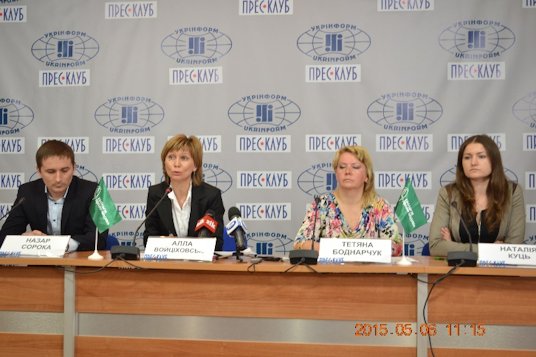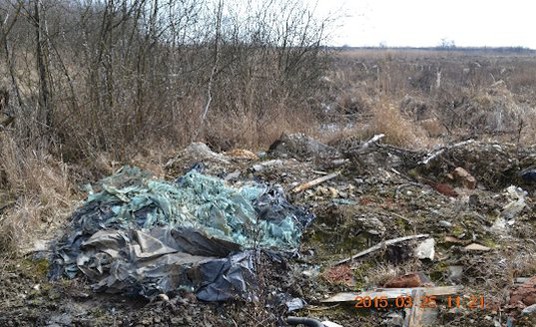On 6 May 2015, International charitable organization “Environment-People-Law” (EPL) held a press-conference under the title “After “clean-up” of the Kalush landfill, the concentration of deadly hexachlorobenzene exceeds the norm by half a million times”.

Besides EPL representatives, speakers of the press-conference were Tetyana Bodnarchuk, representative of the State Environmental Inspectorate in Lviv region, and Nazar Soroka, representative of Department of Environment and Natural Resources at Lviv State Administration.
Environmentalists and lawyers at EPL were urged to do practical studies of the situation with hexachlorobenzene waste in Kalush after numerous publications in national and international media, opening of criminal proceedings, initiation of litigation processes, removal of hexachlorobenzene overseas, protests of local communities and in view of the fact that the state declared full removal of the dangerous waste from Kalush, – says EPL lawyer Sophia Shutiak.
Hexachlorobenzene was buried in the landfill in Kalush in the period of 1973-2000 as a result of production of carbon tetrachloride by “Chlorvinil” company (joint stock company “Oriana”). The production of carbon tetrachloride was stopped as a result of ratification of the Grant agreement of Global Environment Fund (the project of removal of substances that deplete the ozone layer) between Ukraine and the European Bank of Reconstruction and Development.
In August 2013, the Department of Construction, Housing, Urban Development and Architecture of Ivano- Frankivsk Regional State Administration held a public procurement procedure for services for the disposal of hazardous hexachlorobenzene waste from Kalush landfill. According to the current legislation, a customer, in this case the Department, is obliged to publish the qualification requirements for the participants of public procurement. Moreover, one of the requirements for the subject who is active in the treatment of hazardous waste is a license for hazardous waste management.
EPL submitted information requests to the Ministry of Environment and the Department of Ivano- Frankivsk Regional State Administration asking to provide qualification requirements that were applied and a copy of the license of LLC ” SI Consort Group LTD “, which won the bidding. However, such information has not been provided. In addition, this information is missing on the official websites of public authorities.
Thus, the procedure of public procurement was carried out despite the lack of qualification requirements for participants, and the winning bidder was the company that has no license to perform operations with hazardous waste, which is a violation of the current legislation and international obligations of Ukraine , – said EPL lawyer Nataliia Kuts.
To dispel myths about the real state of the environment and cleanup of hexachlorobenzene in Kalush, at the end of March 2015 EPL went to Kalush hazardous waste landfill and took samples of soil and water for further research – said EPL environmentalist Alla Voytsikhovska.

On the landfill or in the place that used to be the landfill we saw a mixture of soil with stones, plastic bags and unknown substances. One could feel specific organic smell and there were several observation wells around the perimeter of the landfill. There were no signs of remediation performed here, – adds Alla Voytsikhovska.
Hexachlorobenzene is an extremely toxic substance banned worldwide by the Stockholm Convention. It is very stable and remains in the environment for decades, causing a number of diseases, affecting liver and other organs.
Has the government taken care of the environment, and therefore of its citizens, providing basic living conditions, clean water , soil, air and spending on improving the environmental situation in Kalush area hundreds of millions UAH? In order to answer these questions, EPL sent samples of soil and water taken from Kalush reclaimed landfill to the Scientific Centre of Preventive Toxicology, Food and Chemical Safety named after academician L. I. Medved at the Ministry of Health of Ukraine to analyze the content of hexachlorobenzene. Analysis results are shocking: in the first soil sample taken from reclaimed landfill site in Kalush concentration of hexachlorobenzene is 15,540.0 mg / kg (maximum allowable concentration is 0.03 mg / kg), which means that the norm is exceeded by 518,000 times; in the second sample the norm is exceeded by more than 331 thousand times ( 9,940 mg / kg), in the third sample – by 164 thousand times ( 4,920 mg / kg), in the fourth water sample taken from surface water reservoir hexachlorobenzene is missing – said Alla Voytsikhovska.
The report of the Scientific Centre of Preventive Toxicology, Food and Chemical Safety named after Academician L. I. Vedmed at the Ministry of Health of Ukraine states: the conclusion as a result of chromatogram analysis is that hexane extracts in each soil sample submitted for analysis contain significant quantities of hezachlorobenzene. The identified quantities of hexachlorobenzene in soil samples considerably exceed the hygienic standards set out in 8.8.1.2.3.4-000-2001 sate sanitary standards. Studies results indicate a significant risk to the natural environment and living environment of people residing in the surrounding areas. It is vital to take immediate actions to clean up the soil in the region, as hexachlorobenzene is forbidden to be used and is classified as a persistent organic pollutant (POP).
Hexachlorobenzene was previously used for insecticide treatment of grain before sowing to fight fungus. In the 1950s, in Turkey there was a case of poisoning of 3-4 thousand people because of use of such grain. Hexachlorobenzene is a poison that affects almost all organs and body systems, mainly the liver, cardiovascular and central nervous system. Hexachlorobenzene damages hemoglobin molecules and caused the disease called porphyria, the rate of mortality for which is 14%. If a person is constantly in an environment contaminated with hexachlorobenzene, he/she may develop chronic fatigue, headache, dry mucous membranes, sometimes nausea. 1-1,5 hours stay in polluted environment is sufficient for acute poisoning characterized by such symptoms as low blood pressure and sensory deviations. In case of acute poisoning a person should drink 6-8 glasses of water with 2% soda solution, induce vomiting and drink activated charcoal, and hospitalization is required, – said EPL environmentalist Kateryna Norenko.
It may take a decade to investigate criminal proceedings while enterprises with no permits and production capacity will “clean” territory of Ukraine. The state control over the disposal of hazardous waste from Kalush landfill is absent, and people living in Kalush continue to suffer from deadly poison.
Therefore, we demand to conduct an independent international examination of the environment in Kalush landfill, to immediately investigate abuses by officials and companies involved in removing hexachlorobenzene from Kalush landfill. It is vital to find out why the waste containing 43 to 83 mg / kg of hexachlorobenzene were removed abroad and the waste with hexachrolobenzene concentration exceeding 15 thousand mg / kg remained in Kalush, to take relevant measures, to remove waste and contaminated soil from Kalush landfill at the costs of enterprises and officials that performed waste disposal and control – added Alla Voytsikhovska.
In addition, EPL prepared a statement declaring the landfill site in Kalush to be a zone of ecological emergency. You may read the statement here.
The situation at the landfill requires wide publicity. Local residents have a right to know about the actual situation around the landfill and about impact on their health. EPL is ready to give free advice and legal assistance to all citizens willing to protect their right to safe and healthy environment, – summarized Sofia Shutiak .
For further information please contact:
Alla Votsykhovska, EPL environmentalist of the 1st category
Email: alla.voytsyhovska@gmail.com, tel.: (032) 225 – 76 – 82
Sophia Shutiak, EPL lawyer of the 1st category
Email: sofiya.shutiak@gmail.com, tel.: (032) 225 – 76 – 82
Nataliia Kuts, EPL lawyer
Email: natalia.kuts1@gmail.com, tel.: (032) 225 – 76 – 82
Kateryna Norenko, EPL environmentalist
Email: kateryna.norenko@gmail.com, tel.: (032) 225 – 76 – 82

